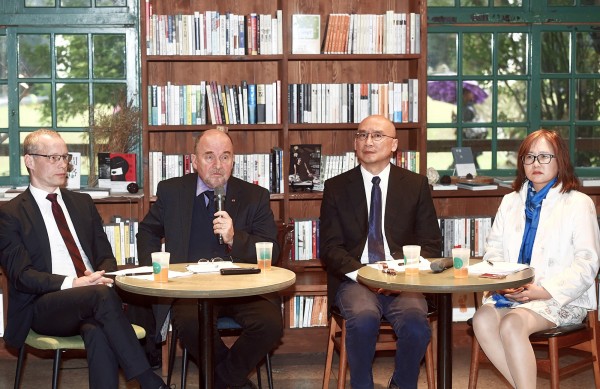《TAIPEI TIMES》 Germany’s truth committee talks historical justice

Federal Foundation for the Study of Dictatorship in East Germany chairman Rainer Eppelmann, second left, talks about his nation’s experiences in dealing with the Socialist Unity Party of Germany and its ill-gotten assets at a forum held by the Ill-gotten Party Assets Settlement Committee at Taipei’s Yue Yue Bookstore yesterday. Photo: Chien Jung-fong, Taipei Times
TRANSITIONAL JUSTICE: At a forum overshadowed by KMT protesters, foundation chairman Rainer Eppelmann said letting people tell their stories is as crucial as justice
By Stacy Hsu / Staff reporter
Leaders of a German government-funded foundation tasked with assessing the legacy of the German Democratic Republic (GDR) yesterday stressed the importance of dialogue, education and preservation of memories when dealing with a country’s authoritarian past, after the legislature last month passed the Act on Promoting Transitional Justice (促進轉型正義條例).
Federal Foundation for the Study of Communist Dictatorship in East Germany chairman Rainer Eppelmann and foundation deputy director Robert Gruenbaum discussed their country’s experience of handling the Socialist Unity Party of Germany and its illegally obtained assets at a public forum in Taipei at the invitation of the Executive Yuan’s Ill-gotten Party Assets Settlement Committee.
The foundation was established in 1998 by the Bundestag to clarify historical truths and promote human rights education.
Eppelmann, who spent the first 46 years of his life living under East Germany’s authoritarian regime, said it is imperative to legally restore the reputation of political victims, but it is equally important to let them tell their stories and share their experiences.
“The purpose of doing so is to prevent people today and tomorrow from committing the same mistakes and to preserve the memories of what happened in the past,” Eppelmann said.
Dialogue with the perpetrators is a must, as most of them have been living with the fear that others will find out about who they once were and will do to them what they used to do to others.
That is why efforts should be made to let perpetrators know that people are not looking for retaliation, but rather seeking an explanation and a sincere apology, he said.
“People living in the same society must talk to each other and explain themselves. Otherwise, how could we live together?” he said.
At a time when more people than ever are born in democratic societies and take democracy for granted, it is all the more important to teach people about authoritarianism and the values of democracy, Eppelmann said.
Younger Germans do not have any any experience of the country’s auhoritarian past, so the government has attempted to teach them what people’s lives used to be like, Gruenbaum said.
“It is vital to incorporate history about East Germany into college education, because only when college students have a clear understanding of that part of history can they pass the knowledge onto the next generation,” Gruenbaum said.
The forum was overshadowed by members of the Chinese Nationalist Party (KMT) protesting against government efforts to recover the party’s illegitimately gained assets and remove past authoritarian symbols. Eppelmann was asked how such protests should be dealt with.
“Protests are normal, as long as they are not violent,” he said.
Eppelmann from Monday to yesterday led a three-member delegation to Taiwan, which met with officials from the assets committee, the Ministry of the Interior, the Ministry of Culture and the Mainland Affairs Council.
They also visited sites of cultural significance, including Chiang Kai-shek Memorial Hall and the National 228 Memorial Museum.
新聞來源:TAIPEI TIMES

















